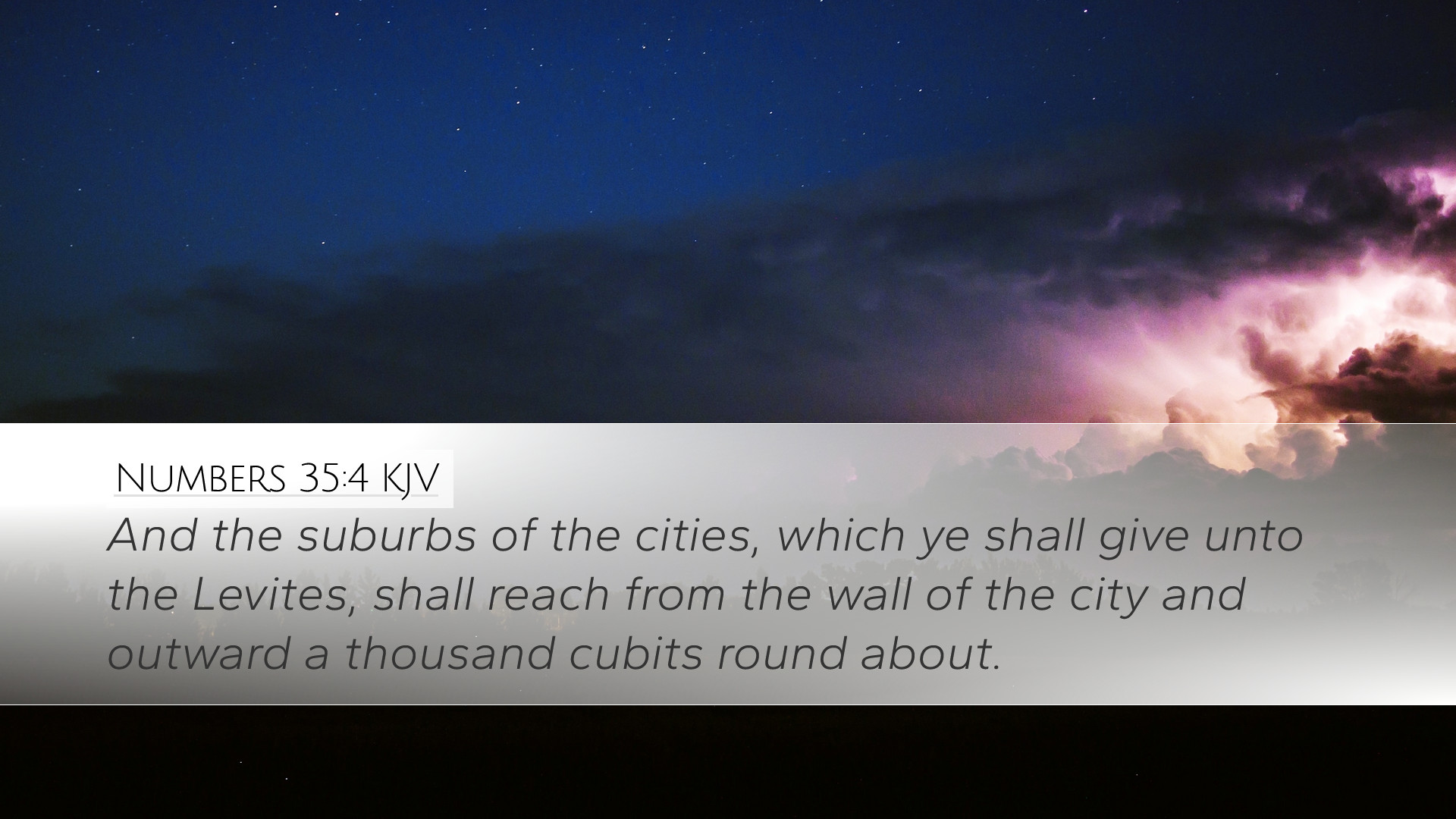Commentary on Numbers 35:4
Verse: Numbers 35:4 – "And the suburbs of the cities, which ye shall give unto the Levites, shall reach from the wall of the city and outward a thousand cubits round about."
Introduction
This verse is located within a larger context addressing the allocation of cities and towns to the Levites—the tribe entrusted with religious duties and temple services. As we explore this verse, we will glean insights from respected public domain commentaries including those by Matthew Henry, Albert Barnes, and Adam Clarke. Such exegesis is crucial for understanding the significance of the cities of refuge and the Levites’ unique role within Israel.
Contextual Background
The narrative in the Book of Numbers describes the Israelites' wanderings in the wilderness and their preparations to enter the Promised Land. Numbers 35 specifically focuses on the establishment of cities for the Levites, a tribe that did not receive a territorial inheritance like the other tribes, emphasizes their importance in guiding Israel spiritually.
Levitical Cities
According to Matthew Henry, the Levites were given cities to dwell in because they were set apart for the service of God. They were to instruct the people, maintain the worship, and preserve the law. The suburbs surrounding these cities were designed to provide the Levites with space for their livestock and agricultural needs, while ensuring that they remained accessible to the people who relied on them for spiritual guidance.
The Significance of 1000 Cubits
- Access and Protection: Albert Barnes points out that the measurement of 1000 cubits (approximately 1,500 feet or 450 meters) signifies a considerable distance, allowing for safe access for those seeking refuge or counsel, without encroaching on property owned by the Levites.
- Symbolic Meaning: Adam Clarke observes that the number 1000 in Biblical texts often symbolizes completeness or divine governance. The defined boundaries provided by the 1000 cubits serve to illustrate God's provision for the Levites and His sovereign authority in the establishment of the community.
The Role of the Levites
The Levites played a crucial role in Israelite society, acting as spiritual leaders and mediators of God’s law to the people. As stated in Matthew Henry's commentary, their physical separation into cities reflects their spiritual separation and devotion to God. This distinction not only elevates the status of the Levites but also reinforces the necessity of having dedicated individuals responsible for maintaining the spiritual life and order among the people.
Ecclesiastical Reflection
Reflecting on this arrangement, theologians emphasize that just as God provided for the Levites, He also provides for those called into ministry today. The principle of providing for those who serve in spiritual capacities remains relevant in contemporary ecclesiastical structures.
Cities of Refuge
Numbers 35 is critically interconnected with the Cities of Refuge established as safe havens for those who accidentally committed manslaughter. In this context, the Levites housed within these cities become key figures of mercy and justice. Barnes notes that the Levites' role emphasized teaching the law concerning such matters, thus highlighting the dual functions of protection and instruction inherent in their cities.
Legal and Moral Implications
Emerging from the designated boundaries of these cities is an exploration of legal and moral implications. The Levites held a unique station that required them to maintain justice by upholding the laws given to Israel. As Henry notes, the strict boundaries symbolize not only physical space but also moral delineation, reminding the community of the divine law and the need for righteousness.
Lessons for Modern Believers
- Community Stewardship: Understanding the Levites' designated cities encourages modern believers to appreciate the importance of community stewardship within their congregations and societies.
- Equipping Ministers: The Levites' provision serves as a foundational principle for supporting today's ministers and church leaders, ensuring they are equipped and positioned to fulfill their calling.
- Seeking Spiritual Refuge: The cities of refuge can serve as a metaphor for finding safety and guidance within the church, where believers can seek help and grace when situations lead them to despair.
Conclusion
Numbers 35:4 encapsulates rich theological insights regarding God's provision for the Levites and indirectly speaks to the framework of ministry and community safety today. The verse not only highlights the physical allocation of urban space but also emphasizes spiritual responsibility, accessibility to divine truths, and the protective nature of God’s design for His chosen leaders. As pastors, students, and theologians reflect on this passage, they are reminded of the integral role that spiritual leaders play in guiding and nurturing God's people.


